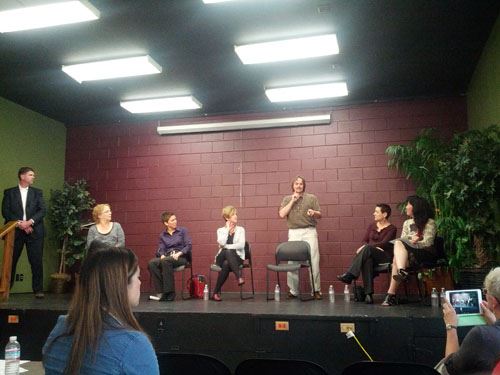NorCRID's Community Collaborations

In early 2012, based on the impact of these one-stop centers on the Deaf and interpreting communities in the San Francisco Bay Area, a local Deaf agency, DCARA headed by Jim Brune, joined efforts with NorCRID with Robin Mills, Terri Manning and Kendra Keller to form the DCARA-NorCRID Joint Improving Interpreting Project. Together the Joint Project set working goals and decided it was time to collect information and do something.
The project began with a survey disseminated to the NorCRID membership. Then, in June of 2012, we held a community forum to discuss the findings and start collecting ideas for how to address the issues. Following that, at our 2012 Northern California RID Chapter conference, we invited Shawn Broderick from the state of Washington's task force to present on their process to inform our own, and conducted discussions to further determine the need for action. Lastly, we held two panels; one of spoken language agencies and one of sign language agencies. notes are attached. Our goals for the panels were to educate spoken language agencies, educate agencies and the community about the difference between ASL agencies and spoken language agencies' approach and services, and to begin the process of assessing quality of services provided/received, via community input.
From all of the above, we narrowed down the areas of need and drafted 3 sets of documents - truly, drafts - (the link is found here: Available norcrid.org under ABOUT "NorCRID's Community Collaborations."
- Recommendations for Agencies Providing ASL Interpreting Services
- Talking Points: What Differentiates an ASL Agency from a Spoken Language Agency in Providing ASL Services
- Assessment Tool: checklist to assist Deaf consumers, interpreters, and hearing consumers to assess services received.
- Panel Notes: Spoken Language Agency Panel, Saturday, January 26, 2013
We then looked at areas to continue work and decided to start with how the Deaf and interpreting communities can give and get feedback, as a way to improve services. We also discussed the idea of a rating system. We held an all day set of focus group session, with 4 groups - Deaf interpreters, Deaf community members, Coda interpreters and hearing interpreters, each group with a facilitator, and responding to a set of questions for guiding discussion.
We are now scheduling a follow up to the focus groups with the intent of setting up work groups to form a multi-directional approach to the impact of the one-stop shopping agencies and the overarching concern of interpreter qualifications and feedback. Community training for consumers and continuing the conversation on individual levels about qualified interpreters is where we're headed at this point.

